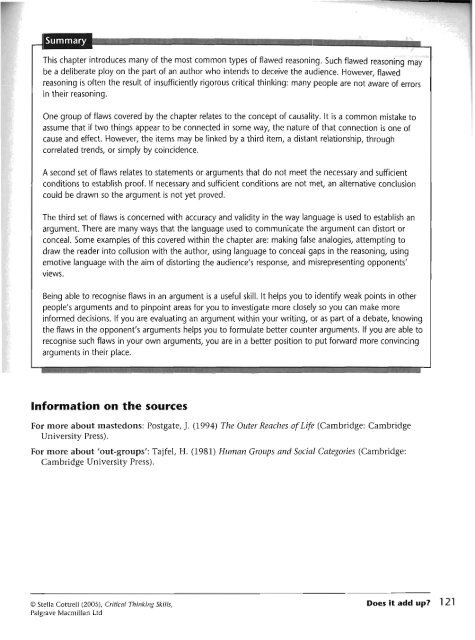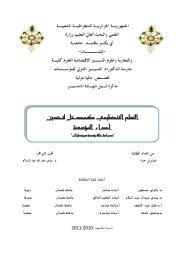Critical Thinking Skills - Developing Effective Analysis and Argument(2)
Critical Thinking Skills - Developing Effective Analysis and Argument(2)
Critical Thinking Skills - Developing Effective Analysis and Argument(2)
You also want an ePaper? Increase the reach of your titles
YUMPU automatically turns print PDFs into web optimized ePapers that Google loves.
This chapter introduces many of the most common types of flawed reasoning. Such flawed reasoning may<br />
be a deliberate ploy on the part of an author who intends to deceive the audience. However, flawed<br />
reasoning is often the result of insufficiently rigorous critical thinking: many people are not aware of errors<br />
in their reasoning.<br />
One group of flaws covered by the chapter relates to the concept of causality. It is a common mistake to<br />
assume that if two things appear to be connected in some way, the nature of that connection is one of<br />
cause <strong>and</strong> effect. However, the items may be linked by a third item, a distant relationship, through<br />
correlated trends, or simply by coincidence.<br />
A second set of flaws relates to statements or arguments that do not meet the necessary <strong>and</strong> sufficient<br />
conditions to establish proof. If necessary <strong>and</strong> sufficient conditions are not met, an alternative conclusion<br />
could be drawn so the argument is not yet proved.<br />
The third set of flaws is concerned with accuracy <strong>and</strong> validity in the way language is used to establish an<br />
argument. There are many ways that the language used to communicate the argument can distort or<br />
conceal. Some examples of this covered within the chapter are: making false analogies, attempting to<br />
draw the reader into collusion with the author, using language to conceal gaps in the reasoning, using<br />
emotive language with the aim of distorting the audience's response, <strong>and</strong> misrepresenting opponents'<br />
views.<br />
Being able to recognise flaws in an argument is a useful skill. It helps you to identify weak points in other<br />
people's arguments <strong>and</strong> to pinpoint areas for you to investigate more closely so you can make more<br />
informed decisions. If you are evaluating an argument within your writing, or as part of a debate, knowing<br />
the flaws in the opponent's arguments helps you to formulate better counter arguments. If you are able to<br />
recognise such flaws in your own arguments, you are in a better position to put forward more convincing<br />
arguments in their place.<br />
Information on the sources<br />
For more about mastedons: Postgate, J. (1994) The Outer Reaches of Life (Cambridge: Cambridge<br />
University Press).<br />
For more about 'out-groups': Tajfel, H. (1981) Human Grorrps <strong>and</strong> Social Categories (Cambridge:<br />
Cambridge University Press).<br />
O Stella Cottrell (2005), <strong>Critical</strong> Thiilkir~ <strong>Skills</strong>,<br />
Palgrave Macmillan Ltd<br />
Does it add up 1 21 1



